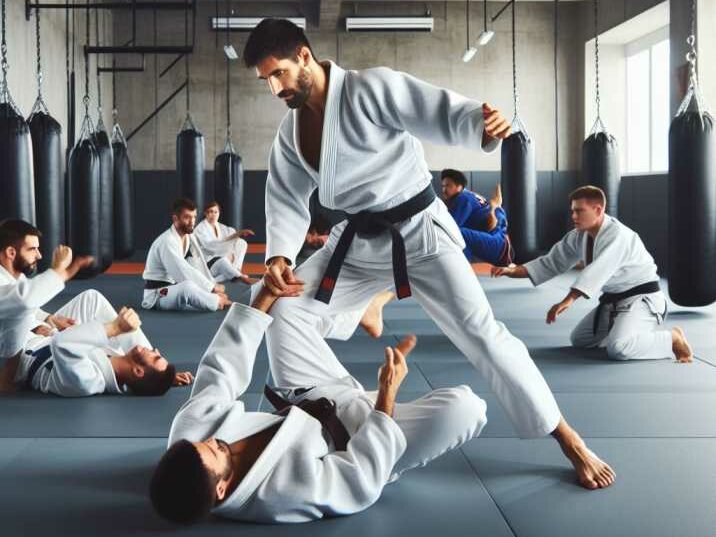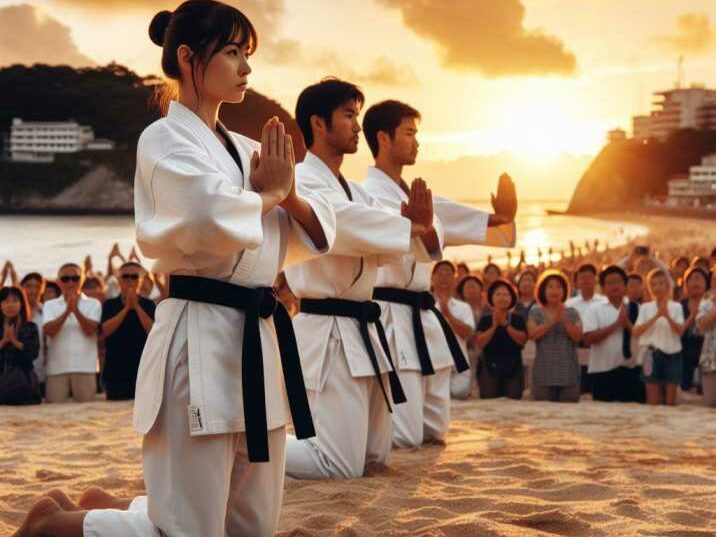Difference b/w Jiu Jitsu and Karate
Table of Contents
Introduction
In the vast realm of martial arts, two disciplines that often spark curiosity and interest are Jiu Jitsu and Karate. While both are powerful systems of self-defense, they differ significantly in their techniques, origins, and philosophies. Let’s embark on a journey to explore the intricacies of these two fascinating martial arts difference b/w Jiu Jitsu and karate.

The Origins and Histories
Explore the historical roots of Jiu Jitsu and Karate.
To truly understand the difference b/w Jiu Jitsu and karate, it’s essential to delve into their origins. Jiu Jitsu, a Japanese martial art, traces its roots back to the samurai era, focusing on ground fighting and submissions. On the other hand, Karate, originating in Okinawa, Japan, is characterized by striking techniques and linear movements, heavily influenced by Chinese martial arts.

Philosophical Underpinnings
Uncover the philosophical principles guiding Jiu Jitsu and Karate.
Beyond physical techniques, both Jiu Jitsu and Karate embody distinct philosophies. Jiu Jitsu emphasizes leverage and technique over brute strength, promoting the idea that a smaller, weaker person can successfully defend against a larger opponent. Karate, on the contrary, places a strong emphasis on discipline, respect, and the development of character through rigorous training.
Techniques and Movements
Analyze the fundamental techniques employed in Jiu Jitsu and Karate.
Jiu Jitsu stands out for its ground-based techniques, emphasizing joint locks and submissions. Practitioners learn how to use an opponent’s energy against them, employing sweeps, throws, and grappling on the mat. In contrast, Karate relies on powerful strikes, kicks, and punches executed from a standing position, emphasizing speed and precision.
Self-Defense Applications
Discuss real-world applications of Jiu Jitsu and Karate for self-defense.
Understanding the practical applications of these martial arts is crucial. Jiu Jitsu excels in close-quarter situations and ground encounters, offering effective self-defense for real-world scenarios. Karate, with its emphasis on striking, is designed for quick and decisive actions, making it suitable for defending against standing threats.
Training Approaches
Explore the training methodologies employed in Jiu Jitsu and Karate.
The journey to mastery in Jiu Jitsu and Karate involves distinct training approaches. Jiu Jitsu places a premium on live sparring (rolling) to simulate real-world scenarios, fostering adaptability and quick thinking. Karate, on the other hand, often incorporates katas – pre-arranged sequences of movements – to refine technique, along with partner drills and sparring.
Uniforms and Belt Systems
Compare the uniforms and belt systems in Jiu Jitsu and Karate.
The attire worn by practitioners and the progression through belt ranks offer insights into the structure of these martial arts. Jiu Jitsu practitioners typically wear a gi (uniform) and progress through a belt system that symbolizes their skill level. Karate also employs a belt system, but the uniform, known as a gi, may vary in style, and the ranking system can differ between schools.

Popular Culture and Representation
Explore how Jiu Jitsu and Karate are portrayed in movies, TV, and popular culture.
The influence of martial arts on popular culture is undeniable. Jiu Jitsu and Karate have made their mark on the big screen, with various films showcasing their techniques and philosophies. Examining how these martial arts are represented in popular media provides a unique perspective on their global impact and recognition.
Choosing the Right Path
Provide guidance for individuals deciding between Jiu Jitsu and Karate.
For those considering embarking on a martial arts journey, the choice between Jiu Jitsu and Karate can be daunting. Consider your personal goals, preferences, and the aspects of each martial art that resonate with you. Visiting local dojos, observing classes, and talking to instructors can help you make an informed decision.
Conclusion
In conclusion, the difference b/w Jiu Jitsu and karate extends beyond physical techniques; it encompasses history, philosophy, and cultural influences. Whether you’re drawn to the ground-based intricacies of Jiu Jitsu or the powerful strikes of Karate, both martial arts offer valuable lessons in discipline, self-defense, and personal development. Embrace the journey, and let the martial arts become a transformative force in your life.
By understanding the difference b/w Jiu Jitsu and karate , you can embark on a path that aligns with your goals and resonates with your spirit. The world of martial arts awaits, offering a rich tapestry of techniques, philosophies, and lifelong lessons for those willing to explore it.
Frequently Asked Questions (FAQs)
1. What is the primary difference b/w Jiu Jitsu and Karate?
- Answer: Jiu Jitsu focuses on ground-based techniques and submissions, while Karate emphasizes striking techniques executed from a standing position.
2. Are Jiu Jitsu and Karate suitable for self-defense in real-life situations?
- Answer: Yes, both martial arts have practical applications for self-defense. Jiu Jitsu is effective in close-quarter encounters and ground situations, while Karate excels in defending against standing threats.
3. How do the philosophies of Jiu Jitsu and Karate differ?
- Answer: Jiu Jitsu emphasizes leverage, technique, and adaptability, while Karate places a strong emphasis on discipline, respect, and character development.
4. Is there an age limit for starting Jiu Jitsu or Karate?
- Answer: No, both Jiu Jitsu and Karate are suitable for individuals of all ages. Many dojos offer classes tailored to different age groups and skill levels.
5. Do Jiu Jitsu and Karate have belt systems, and how do they work?
- Answer: Yes, both martial arts employ a belt system to indicate a practitioner’s skill level. Advancement is typically achieved through rigorous training, demonstrating proficiency in techniques, and passing examinations.
6. Can I practice Jiu Jitsu and Karate simultaneously?
- Answer: While it’s possible to cross-train in different martial arts, it’s essential to dedicate sufficient time and effort to each discipline to truly master its techniques and principles.
7. Are there specific uniforms for Jiu Jitsu and Karate, and why?
- Answer: Jiu Jitsu practitioners typically wear a gi (uniform) designed for ground grappling, while Karate gis may vary in style and are tailored for standing techniques. The differences reflect the martial arts’ distinct focuses.
8. How often should one train in Jiu Jitsu or Karate to see progress?
- Answer: Progress varies among individuals, but consistent training, ideally several times a week, is essential for skill development and mastering techniques in both Jiu Jitsu and Karate.
9. Are there competitions for Jiu Jitsu and Karate?
- Answer: Yes, both martial arts have competitive aspects. Jiu Jitsu competitions, often called tournaments, involve grappling matches, while Karate practitioners may participate in sparring competitions, showcasing their striking skills.
10. How do I choose between Jiu Jitsu and Karate for my martial arts journey?
- Answer: Consider your personal goals, preferences, and the aspects of each martial art that resonate with you. Visiting local dojos, observing classes, and talking to instructors can help you make an informed decision based on your individual needs.


